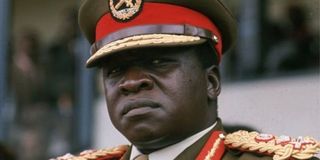Pondering Idi Amin’s legacy four decades after his exit

Idi Amin. PHOTO | FILE
What you need to know:
- Idi Amin liked humiliating Westerners. He ridiculed Wazungu, and taunted their “Godly” powers. Idi Amin did not give a damn. As blunt as former US President Donald Trump was. He did not care much about political etiquette, or playing games.
Every few years a past African leader is discussed, extensively, online. Blacks in the Diaspora (especially those who have never lived or visited the continent) tend to glorify some of these leaders. There are the usual heroes – Julius Nyerere, Kwame Nkrumah, Nelson Mandela, Thomas Sankara, Patrice Lumumba, and Samora Machel. Then the tyrants. Those who send chills of fear and anger down the spines of traumatised Africans.
A few years ago I was somewhere in London with a group of fellow blacks. Robert Mugabe was always in the news. This time it was to do with him falling off stairs while walking to his car. The Western media and the internet were joking, and laughing about it.
“These people always belittle our leaders,” started one brother.
“Yeah. They don’t like us.”
“Mugabe is a hero of the Revolution.”
The conversation sprinted, dashed, and jogged in praise of Robert Mugabe.
There were two Zimbabweans. Male and female, who were very quiet. Throughout the whole verbal theatre, we heard no word from them. Later, I asked why.
“You know how it is. We know cobra bites.”
I said why not educate the brothers?
“It is useless. No need to waste energy. If you were born here, all you know is racism, and the white man denying you basic freedoms, and you’re constantly fighting and struggling. Any time you hear of a black chief from another part of the world being vilified, you don’t want to know the truth...”
I reflected on that for a while.
I remember when I first arrived in Europe in the 1980s I used to recite a poem about corrupt African politicians. I would talk about the problems of progress in Africa. I had grown around bureaucracy, and the joys of independence. I was a Mwalimu Nyerere child, who knew the real Africa, not the imaginary one with roaring lions, and barefoot tribes-folks. I knew about the East African Safari Rally, and the struggle to get an education for only 20 percent, while 80 percent wallowed in unemployment.
But I found my brothers in the Diaspora had a different mindset. They saw everything in Africa as beautiful and fantastic. Some of the poets spoke about lacking identity, and sending racists to the sea. I hardly understood racism. I knew my problems were caused by people of the same colour, and money was always at the centre of it.
Racism was below the soil. Nothing massive in that particular context...
Hopefully, you understand what I’m trying to say.
Last week there was a debate in a WhatsApp groups about the late Ugandan despot Idi Amin. I noticed many of the “Amin the Hero” supporters were young people born after his departure in 1979.
I noticed the shift of blame. From talking of how Idi Amin killed a quarter of a million Ugandans (his own people) to being a victim of the white man. That he supported Palestinians, the cause of Islam, and ended up in exile in Saudi Arabia.
I had to reflect, and was perplexed for days.
Started to see the sunshine in their arguments.
Idi Amin liked humiliating Westerners. He ridiculed Wazungu, and taunted their “Godly” powers. Idi Amin did not give a damn. As blunt as former US President Donald Trump was. He did not care much about political etiquette, or playing games.
Alas. There could have been a sense of empowerment had this man not killed thousands of his own people.
For instance, there was a discussion about a speech he made in Kiswahili. Telling African Americans to learn the language, and that he was ready to teach it.
Fantastic idea, as during his time African Americans were really into Kiswahili. Some of the militant leaders of Black Panthers adopted Kiswahili names.
Here is the bad part.
Since Idi Amin’s demise, Ugandans, I am told, have not so keen on Kiswahili. They are traumatised.
Idi Amin’s soldiers used Kiswahili. There is an association of terror, torture, murder, and the uncomfortable feeling of tyranny.
Why would they feel that way if the chap was a national icon? How can Amin be on the same level as Julius Nyerere, Thomas Sankara, Kwame Nkrumah, Kenneth Kaunda, Ben Bella, and Patrice Lumumba? Did these gentlemen traumatise their people en masse?
Does the fact that a leader is black give him a ticket to be a hero and conqueror? Is there a real misunderstanding of Idi Amin? That his killing of 200,000 Ugandans (including some Tanzanian nationals in Uganda at the time of his rule from 1971-1979) is a misrepresentation engineered by the Western media? That Mwalimu Nyerere helping Yoweri Museveni and Ugandan rebels fight Amin was wrong?
Is there a link with Museveni being a life president? Just like the late Robert Mugabe was?
What makes an African hero?





